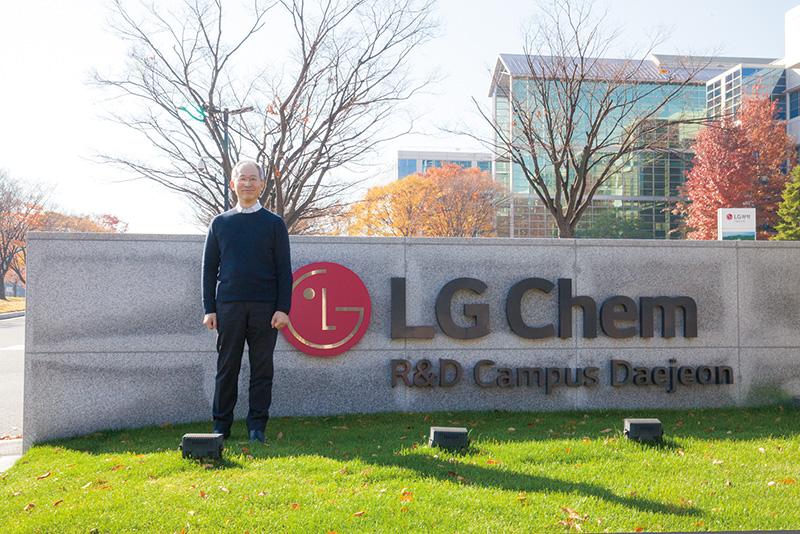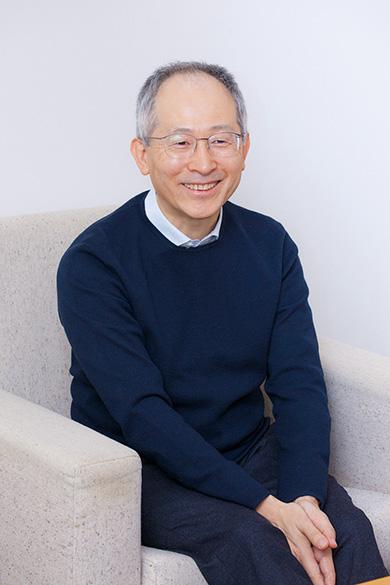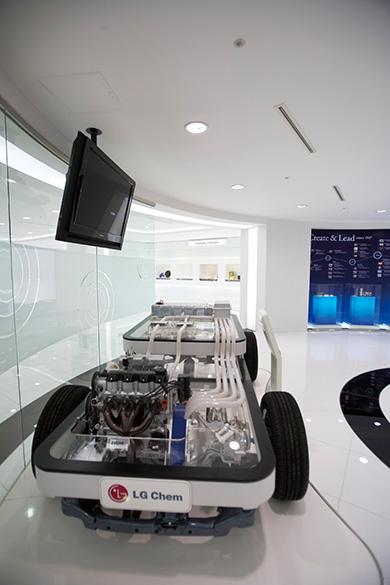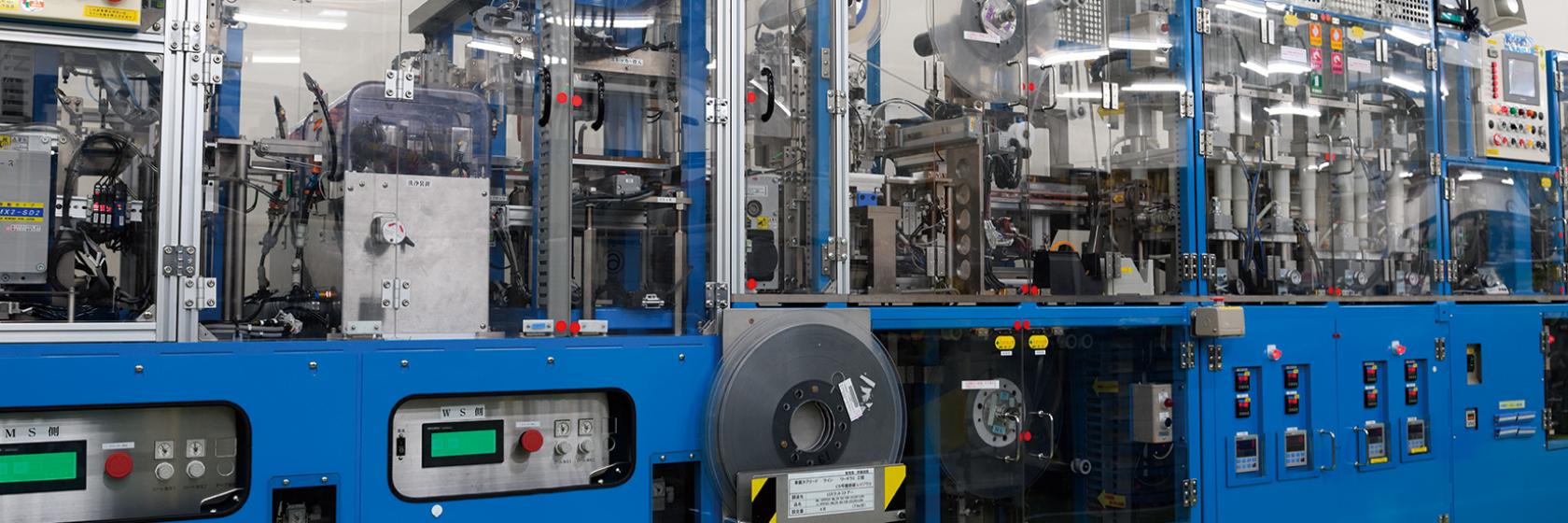
Automotive lithium-ion batteries employ tab leads
Irradiation-crosslin king and process engineering technology excel
Key device for vehicle electrification Lithium-ion batteries and tab lead
The automotive industry is currently undergoing a large paradigm shift, a core of which is the electrification of vehicles and their widespread use on a global scale. Lithium-ion batteries are a key device in electric vehicles. A lithium-ion battery generates DC power through a chemical reaction in which lithium ions move between the positive and negative electrodes. When using this battery, the terminals for connecting these electrodes to the external appliance, or the lead used to draw electricity from the battery, play a very important role. This lead is called a tab lead. Lithium-ion batteries are classified into three types: cylindrical type, prismatic type and pouch (polymer) type. As a pioneer in the tab lead field, the Sumitomo Electric Group started in the late 1990s to supply tab leads for use in smartphones and other consumer electronics. In addition to supplying tab leads for electronic use, the Group is currently making efforts to expand sales of those for pouch-type lithiumion batteries to be mounted in electric vehicles. The tab leads made by the Sumitomo Electric Group have excellent electrolyte resistance. Since they also comprise an insulation layer that suppresses thermal deformation, they achieve highly reliable sealing performance. The key point in enhancing the heat resistance of tab leads is irradiating the insulation layers (heat-resistant polypropylene). The highly reliable sealing performance of Sumitomo Electric Group’s tab leads significantly contributes to enhancing the reliability of the lithium-ion batteries. In other words, the high reliability of lithium-ion batteries is assured through irradiation.
LG Chem, Ltd. is the largest diversified chemicals manufacturing company in South Korea. Since the development stage of their automotive lithium ion batteries, this company has used tab leads made by the Sumitomo Electric Group.

LG Chem, a world-leading company in vehicle electrification High reliability required of tab leads
At present, LG Chem, Ltd. operates in four businesses: basic materials & chemicals, energy solutions, IT and electronics materials, and life sciences. Among them, the company has been particularly committed to the development automotive lithium-ion batteries, the use of which is expected to increase in the near future. The company commenced the development of a pouch-type lithium-ion battery at the beginning of 2000, and began supplying them for automotive use in the late 2000s. Since then, the company has continuously supplied lithium-ion batteries to automobile manufacturers in Europe, North America and South Korea. At present, the company is one of the companies enjoying the top global market share in the automotive lithium-ion battery field.

Geun-Chang Chung, Senior Vice President at the Automotive Battery R&D Center of LG Chem, spoke of the reasons for using tab leads made by the Sumitomo Electric Group as follows: “Safety is very important in manufacturing automobiles. To ensure the safety of automobiles, the pouchtype batteries need to be sealed perfectly; requiring tab leads to maintain extremely high quality and reliability. We highly evaluate the stable quality and high reliability of Sumitomo Electric products as well as their supply capabilities.” Twenty years have passed since the initial development of tab leads, and the market environment has been changing drastically. “Today, many companies provide tab leads with high performance, intensifying competition. We expect that the Sumitomo Electric Group will demonstrate even further its capabilities in the production of tab leads that meet customers need.”

Against the backdrop of intensifying market competition for lithium batteries, LG Chem is now aiming to develop high-capacity compact lithium-ion batteries as one of the world's leaders and to establish appropriate production systems to respond to the increasing demand for electric vehicles.
“LG Chem is now rapidly expanding its lithium-ion battery production capacity. In order to support our increasingly high-speed production lines, we would like the Sumitomo Electric Group to promote technology development to achieve large-sized tab leads for high-capacity batteries and to narrow the seal width while maintaining the durability. In the future development, we may face unexpected problems. At that time, we hope we can investigate the cause of the problem together and devise a solution.”
The Sumitomo Electric Group will respond to the request from the LG Chem by improving the performance of tab leads drawing on its irradiation-crosslinking technology and process engineering technology.
Drawing on expertise in injection molding, optical wiring
and material development
to offer products that meet the needs of society
Tab leads are made by irradiation and cross-linking. The demand for tab leads is expected to expand. What is the future potential of irradiation and cross-linking? We asked Hiroshi Hayami, General Manager of the Energy and Electronics Materials Laboratory, who is at the forefront of this field.
Hayami says, “Except for tab leads, most of the irradiation and crosslinking products are long, such as electric wires and heat shrink tubing. We have been applying irradiation and cross-linking to injection molding products. For example, engineering plastics are expected to be used for the sliding parts of gears and washers. We are particularly interested in plastic lenses that have solder heat resistance. They have been commercialized as lenses that are not subject to heat deformation even at temperatures for soldering electronic parts to substrates. The lenses are expected to come into widespread use as optical wiring components in equipment because they allow transmission of infrared rays. We will continue to develop the irradiation and cross-linking process from various approaches and apply it to new products.”
The Sumitomo Electric Group launched irradiation and cross-linking products in a timely manner in line with the development of electronic equipment (including electric home appliances) and automotive electronics. We remain committed to developing irradiation and crosslinking products that meet the needs of the changing times, as exemplified by tab leads, by taking full advantage of the material development technologies that have been refined through many years of operation. The irradiation and cross-linking process developed by the Sumitomo Electric Group will help “link” the present to a bright future.

Registration of public notification
If you register your e-mail address, we will notify you when the latest issue is published. If you wish, please register from the registration form.
To delete your registration, please visit here.
